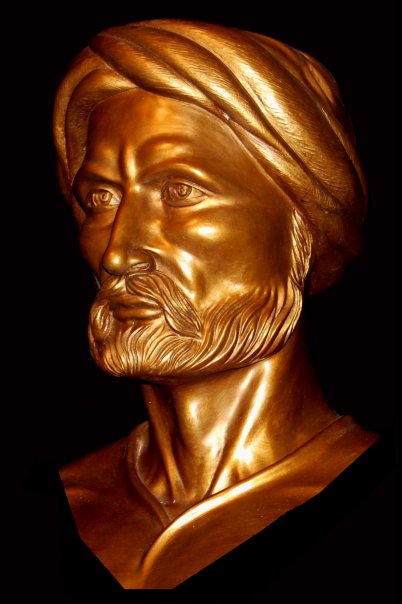Ibn Khaldun
Ibn Khaldun (1332-1406) (W)

Ibn Khaldun Life-size bronze bust sculpture of Ibn Khaldun that is part of the collection at the Arab American National Museum (Catalog Number 2010.02). Commissioned by The Tunisian Community Center and Created by Patrick Morelli of Albany, NY in 2009. It was inspired by the statue of Ibn Khaldun erected at the Avenue Habib Bourguiba (built in 1932) in Tunis. |
Ibn Khaldun (Arabic: أبو زيد عبد الرحمن بن محمد بن خلدون الحضرمي, Abū Zayd ‘Abd ar-Raḥmān ibn Muḥammad ibn Khaldūn al-Ḥaḍramī; 27 May 1332 – 17 March 1406) was a leading Arab historiographer and historian.
He is widely considered as a forerunner of the modern disciplines of historiography, sociology, economics, and demography.
He is best known for his book, the Muqaddimah or Prolegomena ("Introduction"). The book influenced 17th-century Ottoman historians like Kâtip Çelebi, Ahmed Cevdet Pasha and Mustafa Naima, who used the theories in the book to analyze the growth and decline of the Ottoman Empire. 19th-century European scholars acknowledged the significance of the book and considered Ibn Khaldun to be one of the greatest philosophers of the Middle Ages. |
Family
Ibn Khaldun's life is relatively well-documented, as he wrote an autobiography (التعريف بابن خلدون ورحلته غربا وشرقا, at-Taʻrīf bi-ibn Khaldūn wa-Riḥlatih Gharban wa-Sharqan) (“Presenting Ibn Khaldun and his Journey West and East”) in which numerous documents regarding his life are quoted word-for-word.
Abdurahman bin Muhammad bin Muhammad bin Muhammad bin Al-Hasan bin Jabir bin Muhammad bin Ibrahim bin Abdurahman bin Ibn Khaldun, generally known as "Ibn Khaldūn" after a remote ancestor, was born in Tunis in AD 1332 (732 AH) into an upper-class Andalusian family of Arab descent, the family's ancestor was, according to him, a Yemeni Arab who shared kinship with Waíl ibn Hujr, a companion of the Islamic ProphetMuhammad. His family, which held many high offices in Andalusia, had emigrated to Tunisia after the fall of Seville to the Reconquista in AD 1248. Under the Tunisian Hafsid dynasty, some of his family held political office; his father and grandfather, however, withdrew from political life and joined a mystical order. His brother, Yahya Khaldun, was also a historian who wrote a book on the Abdalwadid dynasty and was assassinated by a rival for being the official historiographerof the court. |
Social thought
Ibn Khaldun’s epistemology attempted to reconcile mysticism with theology by dividing science into two different categories, the religious science that regards the sciences of the Qur'an and the non-religious science. He further classified the non-religious sciences into intellectual sciences such as logic, arithmetic, geometry, astronomy, etc. and auxiliary sciences such as language, literature, poetry, etc. He also suggested that possibly more divisions will appear in the future with different societies. He tried to adapt to all possible societies’ cultural behavior and influence in education, economics and politics. Nonetheless, he didn't think that laws were chosen by just one leader or a small group of individual but mostly by the majority of the individuals of a society.
To Ibn Khaldun, the state was a necessity of human society to restrain injustice within the society, but the state means is force, thus itself an injustice. All societies must have a state governing them in order to establish a society. He attempted to standardize the history of societies by identifying ubiquitous phenomena present in all societies. To him, civilization was a phenomena that will be present as long as humans exist. He characterized the fulfillment of basic needs as the beginning of civilization. At the beginning, people will look for different ways of increasing productivity of basic needs and expansion will occur. Later the society starts becoming more sedentary and focuses more on crafting, arts and the more refined characteristics. By the end of a society, it will weaken, allowing another small group of individuals to come into control. The conquering group is described as an unsatisfied group within the society itself or a group of desert bandits that constantly attack other weaker or weakened societies. |

|
|
|
Muqaddimah
Muqaddimah (1337) (W)
The Muqaddimah, also known as the Muqaddimah of Ibn Khaldun (Arabic: مقدّمة ابن خلدون) or Ibn Khaldun's Prolegomena (Ancient Greek: Προλεγόμενα), is a book written by the Arab historian Ibn Khaldun in 1377 which records an early view of universal history. Some modern thinkers view it as the first work dealing with the social sciences of sociology, demography, and cultural history. The Muqaddimah also deals with Islamic theology, historiography, social Darwinism, Darwinism, the philosophy of history, economics, political theory, ecology, and the natural sciences of biology and chemistry.
Ibn Khaldun wrote the work in 1377 as the introduction chapter and the first book of his planned work of world history, the Kitābu l-ʻibar ("Book of Lessons"; full title: Kitābu l-ʻibari wa Dīwāni l-Mubtada' wal-Ḥabar fī ayāmi l-ʻarab wal-ʿajam wal-barbar, waman ʻĀsarahum min Dhawī sh-Shalṭāni l-Akbār, i.e.: "Book of Lessons, Record of Beginnings and Events in the history of the Arabs and Foreigners and Berbers and their Powerful Contemporaries"), but already in his lifetime it became regarded as an independent work on its own. |

|
|
|